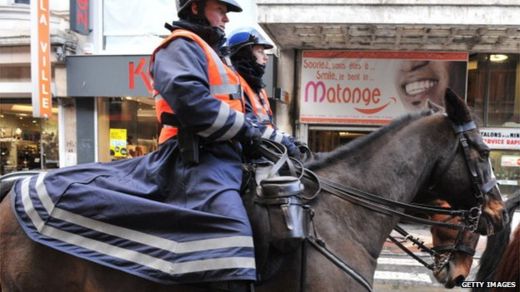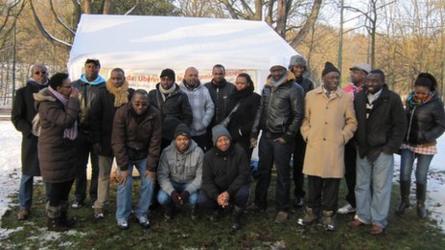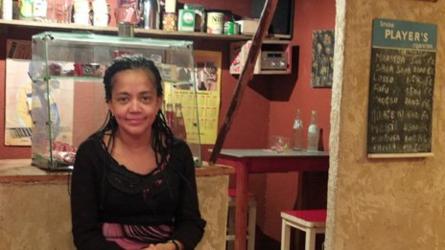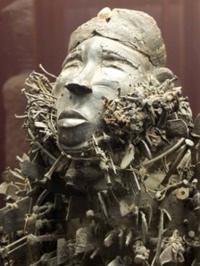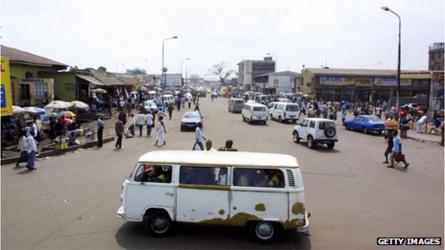Matonge: Congo-Rwanda dispute hits heart of Europe
Tensions between Rwanda and the Democratic Republic of Congo are being played out among the diaspora communities - and perhaps nowhere more so than in one district of the Belgian capital.
African grocers, dozens of hairdressers, and music and video stores line the streets of Matonge in Brussels.
There is a Matonge in the Democratic Republic of Congo's capital Kinshasa too. When Belgium was the colonial power, the Congolese who came to Brussels created a marketplace a little bit like home - although Matonge in Kinshasa is a lot livelier, and the weather is better.
There is a substantial community of people from Central Africa living in the Brussels Matonge - including around 25,000 from DR Congo, many of whom are naturalised Belgian citizens, and perhaps 10,000 Rwandans.
They come to Matonge to shop. But in recent months, they have come to argue, too, about DR Congo's war - and sometimes to fight.
Congolese here blame Rwanda for perpetuating the war in eastern DR Congo by arming and supporting rebel militias, plundering the country's mineral wealth.
Each Tuesday, supporters of the Congolese and Rwandan opposition gather outside the Rwandan embassy to call for an end to Rwanda's interference in DR Congo.
But occasionally the protests spread to the streets of Brussels, and Rwandans in Matonge have been targeted.
Rwandan Grace Nyawumuntu's brother Jules paid the price.
After a demonstration by Congolese opposition supporters outside the Rwandan embassy in Brussels, a gang of Congolese accosted him.
"They asked him: 'Are you Rwandan?'" They chased him through the metro station and beat him," she says. "He was taken to hospital. His jaw was broken."
Trying to 'make peace'
Mostly, the protests and demonstrations remain peaceful. But Ms Nyawumuntu says when things get worse in DR Congo, as during the occupation of the eastern city of Goma by M23 rebels at the end of last year, the Rwandan community in Brussels fears for its safety.
A recent UN report blamed Rwanda for arming M23. Many Congolese in Brussels go further, calling Congolese President Joseph Kabila puppet of the Rwandan government. The mood among Matonge's Congolese is angry.
Rwandan journalist Ruhumuza Mbonyumutwa was roughed up at one Brussels demonstration a few months ago. "I only go into Matonge to get my hair cut now," he told me. "I don't stay there long, it could be dangerous."
Henry Muke Dishuishe, who leads a Congolese opposition political group in Belgium called the High Council for Liberation, acknowledges some young Belgian Congolese are turning to violence.
"I'm trying to do my best to make peace," he says. "But it's hard sometimes - some Congolese they go to Rwandese shops, they want to break it, and make fights in cafes.
"They make violence so the international community takes notice, because they've written many letters, informed many people, and nobody moves. So they say the only recourse they have is violence here in Europe."
Like many Congolese here, Mr Dishuishe is convinced Europeans are abetting Rwanda's illegal mining in DR Congo, including for coltan, a mineral vital to the electronics industry.
"We have an obligation derived from this colonial past - and a particular responsibility because many of the companies operating in DRC are European companies," says Ana Gomes, a Portuguese Member of the European Parliament with the Socialist Party.
"I'm afraid - I sense the tension is escalating and could turn even nastier than it is already."
But she says many turn a blind eye. "There's like a fatigue about the DRC, in spite of the fact that it is one of the most martyrized countries where the people - and in particular the women - are suffering."
Troubled past
Modern Belgium is uncomfortable with its colonial history - and has reason to be.
The brutality of Belgian King Leopold II, who negotiated personal ownership of Congo and began to plunder its vast resources in the 19th Century, is well documented.
A campaign by journalists and early human rights activists led to the creation of Belgian Congo in the 20th Century. Maybe the brutality and forced labour was reduced, but the plundering and patronising attitude to Africans continued until Patrice Lumumba's National Congolese Movement brought independence in 1960.
Even then, Belgium couldn't leave Congo alone - there is evidence of Belgian involvement in Lumumba's assassination when he became the first independent prime minister.
The Royal Museum of Central Africa just outside Brussels symbolises many of the, now unacceptable, attitudes to Belgian colonialism.
In the museum's marbled portico, golden statues celebrate the "civilising mission" - childlike Africans clutching imploringly and gratefully to the legs of a heroic Belgian nurse, or soldier, or statesman.
Anthropologist and curator Bambi Ceuppens, herself half-Congolese and half-Flemish, says the way the museum ignored the history of Congolese people - merely treating them like the animals and plants as exhibits to be stared at - led to the plundering of culture too.
She says there are many masks and idols that have obvious spiritual and ritual significance. "But we have lost their stories," she says. "They were brought here just because they looked nice."
Living together
But some Belgians, mostly from the younger generation, believe their nation has unbreakable links to Africa and a responsibility to help mediate the bloody legacy that still grips DR Congo.
At a quaint, velvet-draped and packed theatre in the Matonge district of Brussels, Belgian producer Raffi Aghekian is introducing his new movie, Kinshasa Mboka Te - Kinshasa Wicked Land - to a mostly white crowd.
It is an offbeat profile of the DR Congo capital, through the lives and sometimes excesses of Kinshasa's people.
"There's a Matonge in Brussels and some of the movie was filmed in Matonge, Kinshasa," Mr Aghekian says. He's concerned that a part of Brussels that should be celebrating Belgium's diversity and history is becoming a place of division and fear.
"I want to bring the two Matonges together," he says.
Another big anti-Rwandan demonstration is planned for 16 February. The news from DR Congo is still bad, with rebel groups, including M23, still in control of many mining areas and tens of thousands still displaced from their homes. Tension in the Brussels Matonge is rising again.
Dan Damon presents World Update on the BBC World Service. Listen back to the programme from Brussels via iPlayer. Additional reporting by Megha Mohan.
